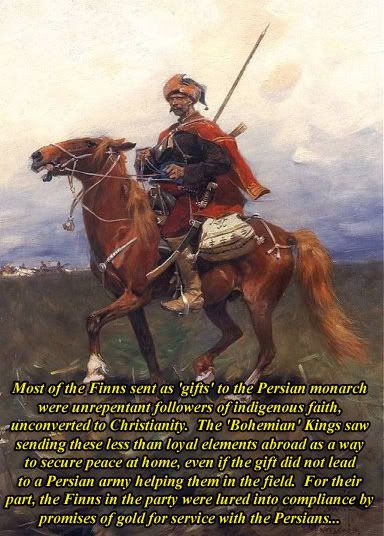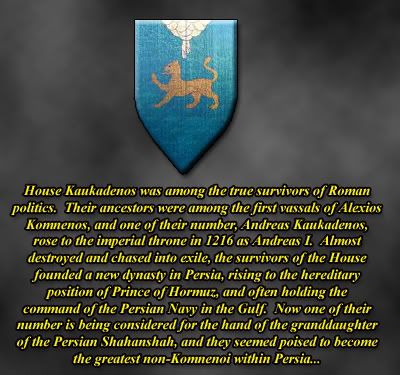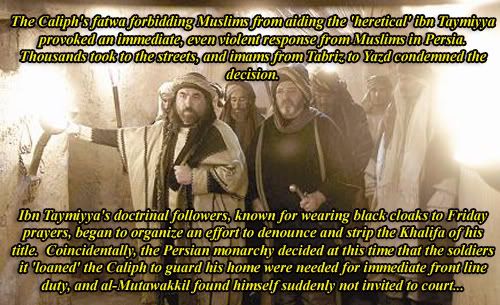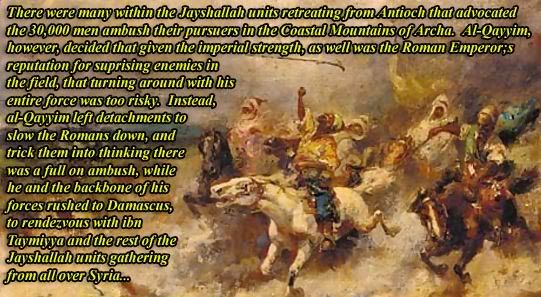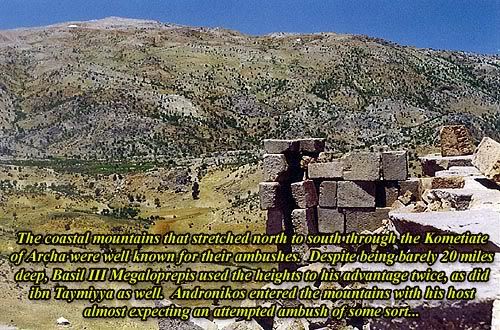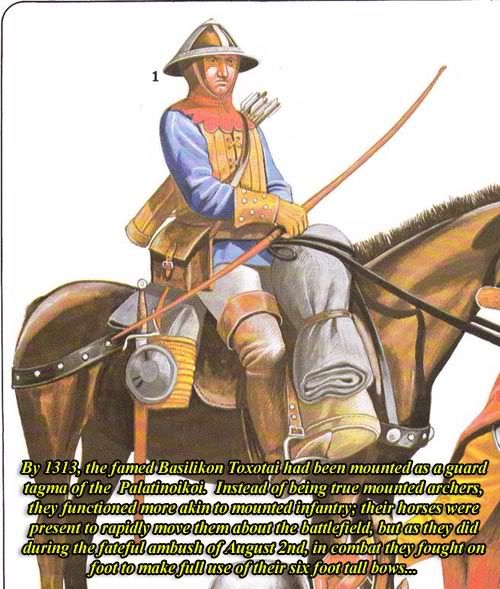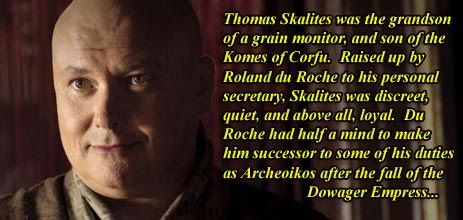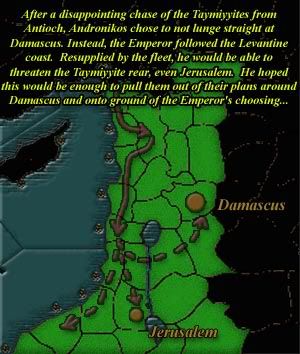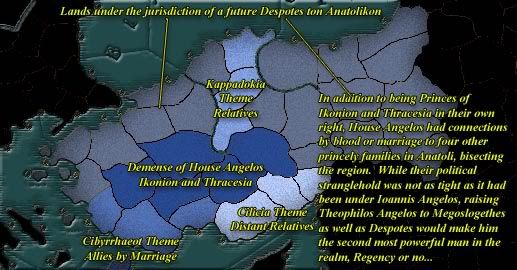asd21593 - The Empire has a great deal of power, yes, wounded as it might be. The Empire has far more threats facing it than Taymiyya, however... and while the Emperor might want to use his full might against the upstart, could it fatally weaken him elsewhere? Will Taymiyya get a D-Day somewhere else in the Mediterranean to relieve the pressure barreling down on him?
Saithis - He's already sent orders out that Damascus is where the Jayshallah should rally if the Empire comes into Syria with overwhelming force--its the central most point for his three concentrations in northern Syria, the garrisons left in Galilee and Judea, and the expected reinforcements from Persia. Whether it turns into a trap depends on what the Persians are doing, and whether al-Qayyim follows his orders...
Bagricula - It was approved by the mods, and it's still open for anyone who's interested! No one has gotten back to me though.
 Zzzzz...
Zzzzz... - Damascus is a happy city! Why is everyone seeing gloom and doom there? :rofl:
Calipah - Though technically today is Eid? Yes? So this would be the Eid update! lol
Welshdude - I have some confusion myself on the subject. I recall there being an Aspar Alexander (or was that Aspar Anatasios) that was an Emperor in the 7th or 8th centuries. If it was Alexander, that'd make our Alexandros the third of his name. If it was Anastasios, it'd make
him third of his name... Andronikos, we know, has a bad reputation amongst future historians, but we know how accurate those can be...
 The_Archduke
The_Archduke - Step one to avoiding the trap? Know there's a trap. Step two? Spring the trap...
Leviathan07 -Truer words could not have been said!
 Clydwich
Clydwich - A lure for whom? Taymiyya, lured by the Caliph? Andronikos, lured by Taymiyya's army and the prospect of a smashing victory? Oh, there could be traps within traps...
cezar87 - The shadow war between du Roche and Sbyslava hasn't seen much face time, but trust me, it's fierce. There was a spate of assassinations in game--minor court functionaries, no one holding an important position, so I included it in the story as a rivalry between the two people who want to rule behind the throne taking a publicly violent turn. And yes, the coming clash should be an epic one--will it be as epic as Thomas II versus Genghis Khan, or more like Basil versus Sulieman?
humancalculator - For your benefit, I posted this update at a different hour. Hopefully you get more sleep!
“Strife is the mother of battle.” - Taqi a-Din ibn Taymiyya
June 1st, 1313
Eirene Komnenos scrambled past a merchant, a smelling ferrier, and then a boy who looked lost. She spun and looked behind her.
Good, the big Finn was not there.
Normally, Eirene loved the Finns. They were big, strong brutes from some land far to the north called Bohemia. Their king sent 300 of his warriors to Isfahan via the Blue Horde, a gift to entice her grandfather to send an army over the Caucasus and through the Horde to attack the Rus from behind. Eirene would have gladly led men on such a march—she'd grown up with stories of her uncle and his campaigns all the way to the Baltic, as well as her mother's ancestors, the Mongols Hulagu, Subotai, and no less than Genghis Khan. Her grandfather, however, had deemed it too far, and too much of a risk. He'd sent several chests of silver north as a way of thanks—but no army. The Finns were now a special bodyguard attached to the royal palace—big burly men with fair skin and dark blonde hair. They were stern, quiet. They didn't need to be loud—she'd heard stories of when they first arrived, and the few times one of the Finns had to defend himself. There were more than a few drunks that had learned the hard way that the cry
”Haake paale!” meant certain death.
I can ride better than my cousins, shoot better than my father, and fight better than anyone my age! she told herself as she blended back into the crowd.
Why won't they let me out of the palace to see the city? I have my dirk, her fingers touched the hilt of the blade hidden underneath her purposefully ragged clothes,
I can handle any cutpurse or fool who thinks he'll manhandle me!
She was tired of being coddled, tired of being perfumed and pampered! She was a princess of the blood—she wanted to be like her mother, a Mongol, riding proud and free, ruled by no one and free to practice with sword and bow rather than knitting and sewing!
It was grandmamma that made them stop teaching me to ride and shoot! Eirene's 11 year old face flushed in anger at the memory.
Stupid grandmamma! Says I should be prepared for a diplomatic arrangement with the Megas Komnenos! Pah!
She would be
damned if she would wed some stinking Greek speaking boy from Konstantinopolis! Guillaume d'Ockham didn't even sound like a proper name—proper names, like
anyone knew, were Greek, Arabic, or Farsi, and certainly
not the bastard language spoken by Western barbarians! The ambassador claimed he was a
strategos a warrior, but Eirene didn't want some trumped up Latin knight rumbling about in steel and plate. She wanted a
noyan, a man of the steppe like those her mother described from her homeland—a man who was one with his horse, knew the bow, loved to hunt and could perform the
tseejiin khondiin. The last man she'd heard perform the ancient Mongol form of throat singing was a bard from Karakorum named Togrul, and she'd instantly been smitten. Unfortunately he'd been caught deflowering the daughter of the Vizier of Tabriz and been summarily executed.
There were other young suitors her father was considering, but none of them stirred her fancy either. The leading contender from inside Persia was Nikolaios Kaukadenos, son of the Prince of Hormuz and grandly titled the Vizier of the Coasts. When she'd first heard about him, he had sounded promising—they said he had a love for the sea, and had several ships of his own in the fledgling Persian navy. He was 25, and his ambassadors claimed he was handsome, gentle, and a good horseman.
However, words did not match appearances.
She had finally met him once—at her mother's birthday banquet earlier in the year. Instead of being handsome, he was tall and gangly, reminding Eirene more of a stork than the son of a prince. But a princely son he was, if a haggard one—the Kaukadenoi were a storied, ancient noble family, bannermen to the
Megas before he was emperor, later Princes of Mosul, until one of their number dared to usurp the throne during the reign of her ancestor, Thomas II. The survivors of the bloodbath that followed found refuge in Persia, first in the Mongol wars, then lands handed out to the veterans afterwards. Michael Kaukadenos' grandfather had been an
archepolitikos, nothing more. His son rose to
Vizier of Yazd, then Prince of the Hormuz. He'd been a rock the Persian royal family could depend on, acting as co-Regent with the present
Shah when his brother Alexandros rode to glory and doom. Rich, powerful, they could make a potent marriage alliance for her grandfather...
But
she[i/] wanted little to do with the stork or his family. When she'd introduced herself, he'd stumbled over his words, stuttering and stammering like a fool. When he ate, he nibbled at his food, as if he was merely pecking at it. He was anything but a dashing noble or an honorable noyan, and she wanted nothing to do with him either!
Politics, however, could dictate differently. Her grandfather was Shahanshah, her brother Nikolaios was sickly. Her cousins Zenobios, Anastasios, and Michael were hotheads, more content to play polo and sleep with the daughters of nobility than to learn to rule. Whoever married Eirene had a fair chance to press to be adopted into the imperial family, and thus, have a claim to the throne...
“Highess!” a familiar baritone voice bellowed in Farsi. Eirene felt all eyes turn and look at her, and as if by magic, they could suddenly see through her purposefully tattered leathers and fur. As merchants nearby fell to their knees, she spun around to find the man who broke her invisibility spell.
“Samil!” Eirene complained to her tormentor, who stood at the entrance to an alley, arms akimbo. The big, burly Persian eunuch had been her personal guardsman since she could remember, and his mustache and beard rippled as he stormed over.
“Come along to the palace, young Highness!” he grumbled as he approached. He never grumbled—Samil was always filled with laughter and jokes! He watched her learn to ride when her mother couldn't teach her, he showed her the shamshir, the bow, and the scimitar. For him to be upset...
Mama must be angry with me!
“I only wanted to see the city!” Eirene protested.
“Yes, and your mother is worried sick!” Samil grumbled, laying a huge mailed paw on her tiny shoulder. “Come along now, young Highness. You're mother is coming, and she shouldn't see her only daughter down in the dirt of the city street!”
“What is that?” Eirene pointed, half from curiousity, half from hoping to distract her displeased minder. A few people were trickling out of the Sultan Sulieman mosque. Unlike most days, their faces were dark, even thunderous...
“Friday prayers are ending,” Samil said. Eirene frowned—there was a note of concern in his voice. From somewhere inside the mosque, the young princess could hear a rumble, a noise that broke into a series of shouts and calls. A first a trickle of people came out, their backs turned, fists raised, as they yelled this and that. Then more, then more...
“Now my brothers!” one of the men, clad white vestments and a black cloak, yelled above the rest. “Now, we support our Amir!” He clambered onto a nearby cart with surprising ease, before dramatically tearing off his black cape and throwing it to the ground. “Those that would betray our faith should be ground under this cloak!”
Eirene heard the clatter of hooves on pavement, and looked over. When her mother arrived, it was not in a litter like most of the Persian royalty. Ayfer Gok Rum-Komnenos would have never stooped to such a level. She galloped into the square on a finely caprisoned courser, its reins the blue, gold, and red of her family. A quiver traced in silver sat at her left hip, a fine shamshir hung from her belt. Other royalty might have needed guardsmen calling and threatening to get crowds to clear a path—Princes Ayfer only needed her glare. Eirene knew that the servants told stories of the times their mistress stared down her own husband, the Crown Prince. Eirene knew the stories to be true—she'd seen it happen.
“We will follow pretenders no more!” the man shouted, a call echoed by a number of others pouring into out of the mosque. Another man, then another, began to tear off their black cloaks. Still others roughly grabbed them, and tried to shove the cloaks back on their shoulders.
“Samil!” Eirene heard her mother bark over the din. She's mad at me... Eirene thought, downcast eyes looking over to the mosque. Angry eyes glared at her, at her mother, at other mosque worshipers. There was another shout—someone calling another worshiper a dog for backing a heretic kafir. Another yelling the Caliph was wrong, and he was the heretic. Then another. Then someone swung.
All hell broke loose.
“Great Tengri...” Eirene heard her mother swear. The noise of the crowd flooding out of the mosque was now loud, ugly, as more people joined in the brawl. City guardsmen tramped by in mail, shouting for the ruckus to stop. Eirene watched, eyes wide as saucers, as the guardsmen drew their blades, and the mob paid no heed.
“Eirene come!” Eirene heard her mother bark. She turned as Samil called out an order. Out of the crowd, five more royal guards materialized in lamellar and gilded helms, flanking her and her mother. They started briskly marching away from the square. Samil's hand compelled Eirene to follow, despite the noises she heard behind her.
“He works with the Roman dogs!”
“I've got more fists where that came from, you cur!”
“Imam al-Nafis has issued a fatwa! He defies the Khalifa! He defies the Khalifa!”
“Mama, why are the people yelling?” Why are they mad at the Caliph? Eirene knew who the Caliph was—her mother and grandfather had brought in tutors to educate her about the Muslim peoples of the realm, as well as her Christian heritage. Someone issued a fatwa against the Caliph? Why?
“The Caliph has said something that mad some of them glad, and some of them angry,” the Princess shouted as Samil continued to roughly pull her towards the great entrance of the Palace of Light.
“So they aren't yelling at us?” Eirene asked. She looked up Samil's face—tension, worry, were plain on his kind face. His shamshir was out, gleaming in the waning sunlight. Why is Samil so worried?
“Some of them are,” Ayfer said as they briskly walked into the shadow of the Palace's bulk. “Some of them might be angry enough to harm you. That's why we're... in the palace!” the Pricess exhaled as the small party burst into the courtyard. Eirene heard several more shouts, and the great bronze doors began to squeal and screech behind her as a dozen men shoved them closed...
==========*==========
August 2nd, 1313
Archa Province
I don't want to be here!
Guillaume d'Ockham couldn't hear the slight swish of passing air, nor could he feel it on his mail covered face, but he heard the dull thud of an arrow hitting chain, piercing, then stopping in the cloth underneath. He turned around awkwardly in his plate, mail and cloth armor, just enough to see his best friend, Emperor Andronikos looking down at a Taymiyyite arrow sticking out of his shoulder armor.
Andronikos laughed. Guillaume was thankful for the noise—it hid the ever so slight rattle of him shaking in his armor.
“Can't even pierce it!” the Emperor laughed, looking over at the Taymiyyite outriders galloping away from the ranks of the Lofandroi. “You've gotta do better than that, you bastards! Ha ha!” All around, the mailed Scotsmen, supposedly Guillaume's men, laughed and jeered as well. The light horsearchers of the rebel army galloped away, letting loose one last defiant volley of arrows that flew wide of their targets.
“Why don't you stay and taste some real metal!?” Andronikos yelled, shaking his fist. “Stinking bastards! Riding off before we can close! Where is Tulug and his damn Mongols!”
As Andronikos started to bellow for the leader of the Mongol horse he sent in a wide arc around the Archa mountains in an effort to pin the Taymiyyites in place, Guillaume looked up at the heights above. The hills and dales of Archa were rocky, hard places, a shrub here or a tree there clung precariously to existence above the rocky trail of the march. Plenty of places even an army could hide in ambush.
D'Ockham swallowed hard.
It'd been this way ever since the Syriatikon had lumbered into its namesake land. Just outside of Alexandretta the imperial army encountered the first scouts of the Taymiyyites, and Tulug Boke, commander of the Mongol tagma, said there'd been fierce skirmishing in the two weeks since, but no sign of the 30,000 Taymiyyites that had been besieging Antioch—the Emperor found Antioch a free city, its fathers saying the Taymiyyites had abruptly pulled out in the middle of the night less than a week before, leaving behind only a few catapults and the tunnels they had been digging under the city defenses. Andronikos permitted his men only a day to smash the Taymiyyite equipment and tunnels, before they were off again, this time towards mountainous Archa. The whole time, the Taymiyyites refused to stop and give battle—nipping and biting at the heads of the Roman columns, but always riding ahead, riding away, like a dancing hornet stinging here or there but always evading the crushing slap that could kill it.
A Scotsman shouted in his own tongue. D'Ockham's mind raced. Did he just see something? The Megoskyriomachos' eyes flashed up to those hillsides, then down at the winding road ahead. The dust of the Taymiyyite horsemen was still receding in the distance...
“We aren't going to catch them at this rate,” Andronikos hissed to no one in particular. Another Scotsman shouted—yes, there were heads poking around up there. Guillaume open gawked to where the Scotsman had pointed. Was that a head? Was it a rock? D'Ockham couldn't tell—and he didn't want to find out! He started to rein up his horse...
“Would you stop staring?” Guillaume felt something bump his shoulder—he turned to see the Emperor glaring at him. “It was a Taymiyyite. Probably a scout. They have an ambush ahead, but we mustn't let them know that we know. That way,” Guillaume could only see Andronikos' cheeks puff out as he smiled under his mail, “we can ambush them! Lofandroi!” the Emperor called, “fall behind me, double column, double ranked! Hetaratoi, the same to my front! We push on!” Andronikos then turned and nodded even further back. The commander of the Basilikon Toxotoi galloped forward.
As the Emperor gave him orders in hushed tones, Guillaume looked back up at the mountainside. He couldn't find that rock now. Was it gone? Was it a Taymiyyite? Were his eyes tricking him? His heart somehow found a way to pound even faster.
Seconds trickled into minutes, minutes trickled on until an hour had passed, then another, as the army marched deeper into the mountains. Every few moments, Guillaume saw another suspicious rock, another strange shape, and he braced. When would the ambush come? Where? How would...
A drum rolled over the hills.
There was the whoosh of an arrow, then another. A Scotsman yelled, a cruel shaft sticking out of his mail. Another laughed—an arrow stuck haphazardly out of his shield.
“Ambush!” Guillaume shouted to no one, and everyone! Now he could see them—men clambering from rock to rock, shrub to shrub, shouting, screaming. Another drum rolled, its thunder echoing with the first. Suddenly hundreds of men in the linens of the Taymiyyites came piling from behind rocks, trees, out of nooks and crannies, charging down the hill towards them...
...towards Andronikos.
Guillaume froze. Every fiber in his body screamed for him to yank his horse around, dig his spurs into its flanks, and gallop back to Antioch as fast he could. His mind screamed at his arms, his legs, but they wouldn't respond! Why won't they respond!? Above the din or men shouting orders, he heard his armor rattle, shake!
“Basilikon Toxotai, Lofandroi!” Andronikos called, his voice calm, reassuring. Calm? How can he be calm?! We've been ambushed! They're coming at us from all sides! “On my command!” the emperor called, raising his mailed arm.
Another arrow flew right by Guillaume's face, but the terrified Megoskyriomachos didn't see it, didn't hear it. All he could hear was screaming, shouting, men running, the entire din merging with the galloping of his own heart! What do I do? What do I do? The Taymiyyites were closer! He could see their beards, now he could see their eyes, wide with anger, teeth white with hate!
“Hold!” Andronikos snarled next to him. Another arrow flew by, catching a Scotsman full in the throat. The man's head snapped back, blood splattering onto Guillaume's leg. Fear slugged Guillaume hard in the stomach. His gut tightened, his stomach roiled! What do I do?!
“Basilikon, open up!” the Emperor roared.
The Basilikon rose from within the ranks of the Lofandroi. The Scots knelt. For a split second the air seemed to stand still as bowmen aimed.
“Mark your targets!” officers barked. All Guillaume could hear was the creak of bowstrings being pulled to the limit....
The roaring twang and whoosh of hundreds arrows filled the air.
Taymiyyites left and right fell aside. Some screamed out their agony. Death came too quickly for others to give a cry. The suddenly charge broke up as quickly as it came, linen clad men stumbling, running for cover. Their comrades above let loose another volley. Arrows filled the air. There was a thwack, loud, almost in Guillaume's ear. He looked over—an arrow was stuck hard in his horse's face barding.
“My God!” d'Ockham screamed, and all at once, his hands and legs finally came to life. Reflexes took over from training, fear destroyed discipline, and his spurs dug wildly into the flanks of his mount. The horse reared in confusion, just as two more black shafts rippled through the air. Unseen to d'Ockham, they tore into the beast's belly.
Guillaume heard his horse scream once more, then felt it lurch to the left. No time to jump, no time to think. Only time to scream, as 1,500 pounds of horse crashed down on him.
==========*==========
September 11th, 1313
Konstantinopolis
A man could get comfortable here, Roland du Roche thought to himself, but said to no one.
There weren't many he could have said it to anyway. He sat alone, save for his trusted secretary and couriers to deliver his proclamations, in one of the many rooms of the Kosmodion Palace. Thomas Skalites would say nothing—and neither would the couriers. One of the privileges of being a co-Regent was that he could choose when and where to conduct his business. The Dowager Empress chose the vast and imposing bulk of the Great Audience Hall to do hers. Roland du Roche chose a smaller, more intimate space. Closeness, he found, allowed him to get a better measure of a man, as well as his intentions.
So he settled back into that gold stitched velvet and did his business. Most of it was routine—the joint Regency left him in charge of water and food supplies for the city. Roland assumed this was at the insistence of the witch. No doubt she hoped the inundating reports of grain monitors, suppliers, aqueduct supervisors and merchants galore would wash away any chance du Roche had to plot for things higher. Roland du Roche was a prodigious man—there was no chance of any such thing!
The arrangement also left him in charge of the City Watch, as well as half of the tagmata left to guard Thrake and The City. Yes, the Dowager Empress controlled the treasury and thus their pay, but du Roche had funds of his own. Quietly, he'd stared giving considerable stipends to the strategoi in charge of the Angeloi as well as the Archontoupoloi. Roland's little birds in the Oikoi were sure the Emperor was displeased with his mother—with the Palatinoikoi on campaign, he needed muscle for the day when Sbyslava went too far. Yes, she had her Filoi, and the Oikoi were sure she had the Kappadokia tagma in her pocket, but one tagma could not stop two, especially one so badly led and equipped as the Kappadokia.
So now, Roland waited. Sbyslava's Filoi were good—ex-Oikoi, most of them—but they were not as good as the original. For every one of his associates she harmed, du Roche's assassins killed five of hers. The number of people willing to gather at her galas and balls was rapidly declining, while du Roche's had never been so popular. The dynatoi, like any good pack of scavengers, knew a walking carcass when they saw one, and they fled, en masse, to man who would shortly be Regent, Megoskyriomachos and Archeoikos at once—perhaps even Kaisar. The chess board had been laid down, the pieces set in place, and he could safely count the moves until he was victorious.
“...and there is a special note...”
Roland looked up, shaken from his thoughts of glory and back to the present. The pudgy, concerned face of Thomas Skalites, his personal secretary, stared back at him. The portly scion of minor gentry, he was Roman through and through. While Thomas was unobtrusive, pliant, and good with numbers and facts, du Roche brought him in primarily because of his history—his family was not a great house by any means, but they were well connected, and they were Romans. Maybe, du Roche remembered saying that day a year before, bringing him in might quell some of those voices complaining there aren't enough Romans in the government.
Gently, the bulbous man offered up a parchment, wrapped in silk and sealed. Du Roche took it. Only a glance at the wax showed the double headed eagle of the imperial stamp. Du Roche glanced back at Skalites—he shrugged. Du Roche did as well, then opened it with his knife. It was a letter, apparently by the emperor's own hand, and sent by the fastest dispatch ship the fleet could find.
Andronikos, as always, had reportedly won a victory—albeit a small one. The Taymiyyites turned out to not have the courage he expected. Despite the wide flanking ride of his Mongol horse, the Taymiyyites broke their siege of Antioch and fled south at speed, galloping towards Damascus. Andronikos had followed swiftly through the Archa mountains, but after a series of attempted ambushes, had decided that pressing towards Damascus would be a mistake. Instead, the Emperor was marching his men back down the Mediterranean coast, fast—when the letter had been sent, he was Tripoli, expecting to reach Joppa by the time the fast courier ship finally reached Konstantinopolis. From there, the Emperor said he would turn inland to take Tiberias and threaten Jerusalem. He reasoned the Taymiyyites were trying to gather their disparate armies, and he hoped a stab into their homeland would compel them to abandon whatever plans they had for him and march south with speed.
The most noteworthy news was the injury of Guillaume d'Ockham in that skirmish. The newly minted Prince of Abydos had his horse killed from under him, and the falling beast had crushed his leg. He was feverish and pain—the Emperor had sent him by ship back to Konstantinopolis, and made special orders for the Regents to prepare churigeons and supplies as necessary for his arrival. Andronikos was insistent that his friend must live, or someone would pay the consequences.
“Skalites,” du Roche murmured, “please inform Doctor Abeghniri and Ypsilanti that they should read on all treatments for an injured leg. Within the day a ship will arrive with the Prince of Abydos. His life could depend on their efforts.”
“Yes, milord,” Skalites pulled out a piece of parchment, and scribbled down the necessary demands. With the professional speed of a clerk, he threw sand on the parchment, shook it till it was dry, then folded it and sealed it within a minute. “Take this to the good doctors!” he called to one of the waiting messengers.
“There's another letter, from the same boat,” Skalites said, offering it to du Roche.
“Read it,” Roland nodded to Thomas, then a servant. Wine appeared in his cup—wine that du Roche downed in a single gulp. Ah, that's better.
“My Lord du Roche,” Skalites began, “I send you the following parchment, to be affixed with your seal and the Great Seal of State, appointing Prince Theophilos Angelos of Ikonion and Thracesia to the office of Megoslogothetes, as well as Despotes ton Anatolikon. By order of His Imperial Majesty, Andronikos, Second of that Name, Megas Komnenos kai Autokrator ton Romanion...” Thomas said, reaching for the Great Seal.
“Don't stamp that order,” du Roche said after a moment. No, he must be mad if he wanted to give Angelos that position! The man'll use it to no good... “I need time to confer with His Majesty personally on that appointment,” du Roche said smoothly. What was the boy thinking?! He's a son-in-law of the old Andronikos! He'll cause trouble to no end!
“Very well, my lord,” Skalites nodded, his mouth twisting slightly.
“You disagree?” du Roche raised an eyebrow. Thomas, you are so easy to read, my friend. When Sbyslava is gone, you would make an excellent Archeoikos for my needs...
“I... well, milord, I do see your point,” Skalites stammered, “but His Imperial Majesty no doubt has some reasons for making such a change! Additionally, I would like to point out to Your Lordship that Prince Angelos has extensive connections and is a powerful...”
“Don't equivocate. I am well aware of Prince Angelos' connections,” Roland sighed, putting a hand to his temple. He looked forlornly at the empty wine cup before him. “That is what makes him dangerous. He is the emperor's brother-in-law, Skalites! Give him Megoslogothetes, and he could push Sbyslava and me out of power, and you with us!”
“I...” Skalites started to open his mouth, before those thick lips snapped shut. Yes, that's it, du Roche smiled thinly. You know if I and thrown out, you'll be caught in the garbage as well!
“I am not disapproving it,” Roland tsked, “I'm merely waiting to confirm from His Majesty the details of the elevation! There are a great many offices that Lord d'Ockham held as Megoslogothetes. Which of these does His Majesty wish to confer on Lord Angelos, hmmm?”
“You're stalling,” Skalites pointed out.
“Exactly,” Roland folded his arms. Stalling for time, stalling for the emperor to change his mind. If d'Ockham comes back to the city and lives, no doubt he'll want his position back. Guillaume is the emperor's personal friend, he'll no doubt win over Angelos...
“It's a risky move, if I may say so, milord,” Skalites said.
I wouldn't be here if I never took risks, Roland du Roche wanted to say in reply.
==========*==========
So the Caliph has made a ruling that has displeased the Taymiyyites who are now organizing a drive to oust the Caliph, while al-Qayyim and the bulk of his army has evaded the Emperor and sped away to Damascus. Guillaume d'Ockham has been badly injured, and the Emperor has decided to forego a direct pursuit in favor of heading straight into Galilee and Judea. Will Taymiyya follow? Will d'Ockham recover? Will the Taymiyyites oust the Caliph? Will the story get out of 1313? More of this momentous year next Rome AARisen! 
 . The most gifted military commander in Muslim history since the time of the Seljiuk Turks versus one of the most ruthless and merciless emperors since Thomas II (freshly baked Isfahan with a sprinkling of orange juice anyone?
. The most gifted military commander in Muslim history since the time of the Seljiuk Turks versus one of the most ruthless and merciless emperors since Thomas II (freshly baked Isfahan with a sprinkling of orange juice anyone?  ) are about to meet at last. It's a pity that Taymiyya will eventually loose. He is different from all other characters since he actually stood up for something grater than himself.
) are about to meet at last. It's a pity that Taymiyya will eventually loose. He is different from all other characters since he actually stood up for something grater than himself. 




